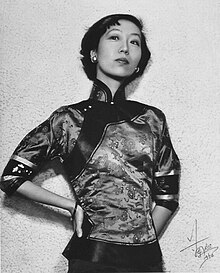Eileen Chang | |||||||||||
|---|---|---|---|---|---|---|---|---|---|---|---|
 Chang in British Hong Kong in 1954 | |||||||||||
| Born | Zhang Ying (張煐) September 30, 1920 Shanghai, Republic of China | ||||||||||
| Died | September 8, 1995 (aged 74) Los Angeles, California, U.S. | ||||||||||
| Pen name | Liang Jing (梁京)[1] | ||||||||||
| Occupation |
| ||||||||||
| Education | St. Mary's Hall | ||||||||||
| Alma mater | University of Hong Kong St. John's University | ||||||||||
| Period | 1932–1995 | ||||||||||
| Genre | Literary fiction | ||||||||||
| Notable works | Lust, Caution Love in a Fallen City | ||||||||||
| Spouse | |||||||||||
| Relatives |
| ||||||||||
| Chinese name | |||||||||||
| Traditional Chinese | 張愛玲 | ||||||||||
| Simplified Chinese | 张爱玲 | ||||||||||
| |||||||||||
| Liang Jing | |||||||||||
| Chinese | 梁京 | ||||||||||
| |||||||||||
Eileen Chang (traditional Chinese: 張愛玲; simplified Chinese: 张爱玲; pinyin: Zhāng Àilíng; Wade–Giles: Chang1 Ai4-ling2;September 30, 1920 – September 8, 1995), also known as Chang Ai-ling or Zhang Ailing, or by her pen name Liang Jing (梁京), was a Chinese-born American essayist, novelist, and screenwriter.
Chang was born with an aristocratic lineage and educated bilingually in Shanghai. She gained literary prominence in Japanese-occupied Shanghai between 1943 and 1945. However, after the Communists defeated the Nationalists in the Chinese Civil War, she fled the country. In the late 1960s and early 1970s, she was rediscovered by scholars such as C. T. Hsia and Shui Jing. Together with the re-examination of literary histories in the post-Mao era during the late 1970s and early 1980s, she rose again to literary prominence in Taiwan, Hong Kong, Mainland China, and the Chinese diaspora communities.[2]
- ^ Sun, Rui Zhen (May 22, 1988). "Eileen Chang's Brief Account of Life and Activities (張愛玲生平和創作活動簡記)". Xueshu Yuekan (學術月刊) (in Chinese) (2): 159–163. Retrieved March 24, 2019.
- ^ "Chang, Eileen (Zhang Ailing) 1920–1995." Encyclopedia of Modern China, edited by David Pong, vol. 1, Charles Scribner's Sons, 2009, pp. 193-195. Gale Virtual Reference Library. Accessed 24 Mar. 2019.